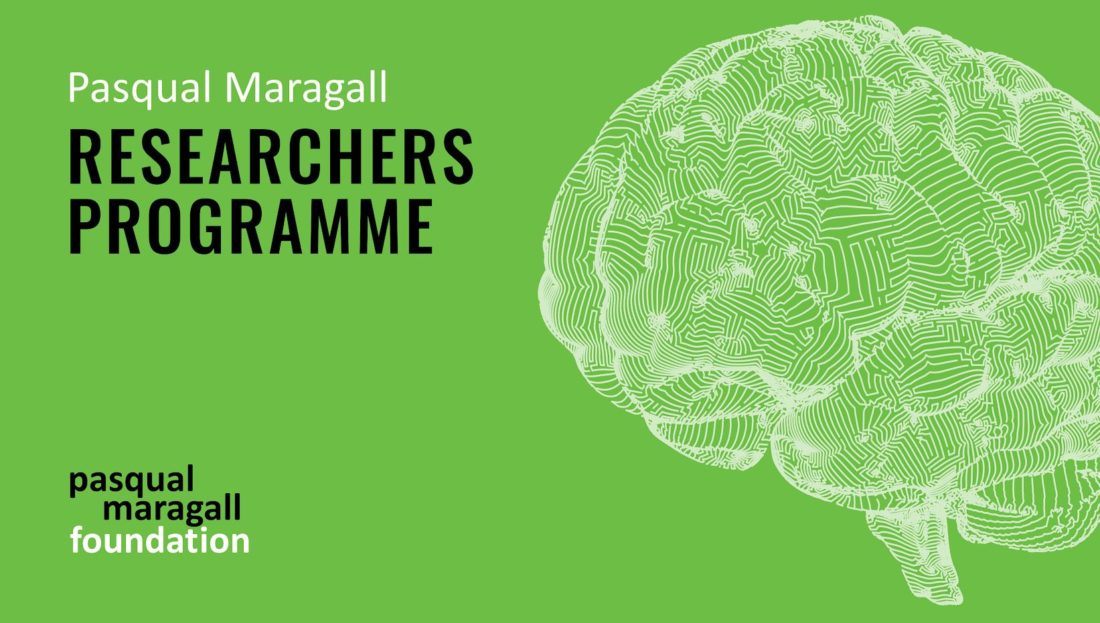
The Pasqual Maragall Foundation announces the winners of the research grants in Alzheimer
- The Pasqual Maragall Researchers Programme (PMRP) will distribute a total of 1.5 million euros among the three selected projects.
- The winning projects address epigenetics, microglia, and the connection between the disease and sleep, reflecting the diversity of approaches needed to understand and address Alzheimer’s.
- The Pasqual Maragall Foundation launches the second call for grants, matching the investment of the first one after the success of the initiative.
Barcelona, October 18, 2023 – The Pasqual Maragall Foundation announces the winners of the first call of its Pasqual Maragall Researchers Programme (PMRP) research grant program. With a total endowment of 1.5 million euros, this initiative, which aims to promote innovative projects in Alzheimer’s research and other age-related neurodegenerative diseases, has established itself as the most significant private grant program in Spain dedicated to research in this field.
Thanks to this first call and the selected projects, the PMRP program will support excellent research led by other centers in Spain, further strengthening the research activities of the Foundation and opening up new perspectives in addressing Alzheimer’s and other age-related neurodegenerative diseases.
“These grants are intended to drive the search for solutions against dementia. They are an investment in the future of scientific research and a strong commitment to the health and well-being of our society. Through this program, we reaffirm our commitment to research on Alzheimer’s and other age-related neurodegenerative diseases, with the belief that science will lead us to a future where these diseases are eradicated,” said Arcadi Navarro, director of the Pasqual Maragall Foundation.
Recipients of the Pasqual Maragall Researchers Programme grants 2022
On one hand, the project led by Pablo Martínez-Lage from the CITA-alzheimer Fundazioa Foundation was selected. The project aims to identify epigenetic signatures that could help define risk profiles for Alzheimer’s disease. “The project we have presented aims to study the disease’s mechanisms from the perspective of epigenetics. It also raises the possibility of acting on these mechanisms through non-pharmacological interventions, controlling risk factors, and promoting healthy lifestyle habits,” explained Martínez-Lage. Alberto Lleó Bisa (Foundation for Research at the Hospital de la Santa Creu i Sant Pau) and Maite Mendioroz Iriarte (Miguel Servet Foundation-Navarrabiomed) are collaborating in this project, strengthening research in this field.
Another of the awarded projects is that of Hugo Peluffo from the Institute of Neurosciences of the University of Barcelona, which focuses on the relationship between aging and Alzheimer’s disease. Specifically, it will explore how immune cells in the nervous system, known as microglia, influence the aging process and the late onset of Alzheimer’s. “There is genetic evidence linking microglia to Alzheimer’s, and, therefore, it plays a significant role in the development of the disease. These cells are essential for the brain because they contribute to cleaning nervous tissue, for example, beta-amyloid protein,” Peluffo detailed. Collaboration with Michael Heneka (University of Luxembourg) will broaden the scope of this research.
Finally, the project led by José Vicente Sánchez Mut from the Spanish National Research Council at the Alicante Institute of Neuroscience will investigate “resilience” to Alzheimer’s disease, exploring why some individuals with high pathology of the disease do not develop symptoms. “The support of the Pasqual Maragall Foundation is a recognition of our work and a step forward in the consolidation of our group at a national and international scale. In particular, it will allow us to investigate how interventions on sleep quality can rescue cognitive abilities in patients despite the pathology and identify new therapeutic strategies to increase resilience to the disease,” explained Sánchez Mut.
New call for PMRP grants
Following the success of the first edition of the program, which received more than 60 applications, the Pasqual Maragall Foundation has announced a new call for PMRP grants, with a new endowment of 1.6 million euros.
The Pasqual Maragall Researchers Programme grants are open to individual projects led by a principal investigator or collaborative projects (up to three groups) led by a consortium coordinator conducting research activities in public or non-profit research organizations in Spain. Interested researchers can find more information on the website https://fpmaragall.org/pasqual-maragall-researchers-programme/ and send their inquiries to the email address researchgrants@fpmaragall.org.
Alzheimer’s in figures
Currently, it is estimated that Alzheimer’s and neurodegenerative diseases affect 900,000 people, translating to one in ten of those over 65 and one-third of those over 85. These conditions are a major cause of mortality, disability, and dependency. If an effective cure is not found, and with increasing life expectancy, the number of cases could triple worldwide by 2050, surpassing one and a half million people in Spain alone, potentially overwhelming healthcare and support systems.

About the Pasqual Maragall Foundation
The Pasqual Maragall Foundation is a private non-profit organization founded in April 2008 in response to the public announcement by Pasqual Maragall (former mayor of Barcelona and former president of the Government of Catalonia) that he had been diagnosed with Alzheimer’s. The Foundation is led by Arcadi Navarro and chaired by Cristina Maragall, Pasqual Maragall’s daughter, who serves as the honorary president.
Currently, around 200 professionals work at the Foundation, with a dual mission of promoting research to prevent Alzheimer’s and offering solutions to improve the quality of life of affected individuals, their families, and caregivers. In the field of scientific research, the Foundation operates the Barcelonaβeta Brain Research Center (BBRC), a research center dedicated to disease prevention and the study of affected cognitive functions in both healthy and pathological aging.
All of this is made possible through the support of about fifteen entities and a social base of more than 61,000 members, who provide financial support to continue the project. Their support is crucial to continue working towards a future without Alzheimer’s, as scientific research is the only path to defeating the disease.
To collaborate with the Pasqual Maragall Foundation: https://fpmaragall.org/donate/ For more information: https://fpmaragall.org/



No Comments